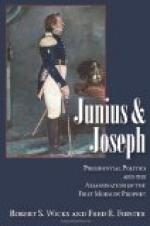Darling was now postmaster of Nauvoo and one of the first presidency. To him she went first. She shrank from him because of his coarseness and the jocular admiration which he sometimes had the audacity to express for her, but she could not forget how assiduous his kindness had been in the days of Elvira’s illness. She found him sitting, his heels on the upper part of a chimney-piece with a fireless grate, reading the Millenial Star. The hot April sun, streaming through the windows of his office, had caused him to take off his coat, which was no longer thread-bare. His shirt sleeves were fine enough and white; the high hat that was pushed far on the back of his head was highly polished. Opulence, self-indulgence, good-nature, and a certain element of fanatical fire mingled in the atmosphere of the postmaster’s office, and made it somewhat turgid.
When Darling heard Susannah’s errand he became serious enough. An apoplectic sort of breathlessness came over him, expressing a degree of interest which she could not understand. He settled his hat more firmly upon his head. “Does the prophet know?”
“He knows. I have said good-bye to him and to Mrs. Smith. It is sad to part with friends that I have known for so many years.”
“And the prophet’s going to let you go, is he?”
Darling, clumsy at all times, in this speech conveyed to Susannah the first faint suspicion that Smith might dream of detaining her by force.
Darling’s youngest daughter, who had been an affectionate pupil to Susannah at Quincy, waylaid her as she came out, and clasped her about the waist with the ardour of an indulged child. She was a blithesome girl of about fourteen.
“I heard you tell father that you are going away. Is it true?” she asked impetuously.
Susannah tried to release herself from the embrace. “Yes, it is true. Never mind, you like your new teacher, you know, just as well as you used to like me.”
“I just guess I don’t,” cried the child defiantly. “But anyhow, if you are going away, I’m going to tell you something.”
Whether the childish love of telling a secret, the girlish love of mischief, or a dawning sense of womanly responsibility was uppermost, it would be hard to tell. There, in the open square, while worthy Saints hurried to and fro on the pavement beside them, while horses jangled their harness and drivers shouted and exchanged their morning greetings, Darling’s youngest daughter drew Susannah’s head downward and hastily whispered to her the fate of her letters to Ephraim Croom.
“I know, for one day since we came here I heard father talking to the prophet. He said you’d written lately while you were at Quincy, and all your letters had been burned. Now that’s the truth; and I said to myself ’twas a sin and a shame, and that you ought to know. Now don’t go and tell tales of me, or father will be mad—at least, as mad as he ever can be with me.” A toss of the pretty head accompanied these words, a flash of conscious power in the bright eyes, the spoilt child knowing that her father was in her toils now, as truly as any future lover would ever be. The school bell was ringing. The girl, her bag of books hanging from her arm, ran with the crowd of belated children.




